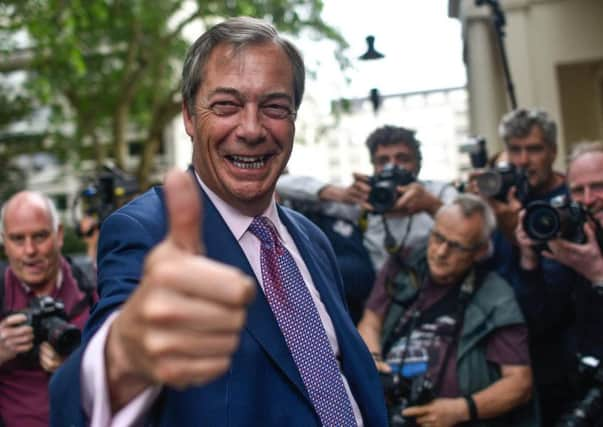Brexit: How Tories and Labour can avoid political abyss – leader comment


The multiple post mortems being carried out into the result of the European Parliament elections were reaching predictable conclusions yesterday.
For those who want to leave the European Union regardless of the cost, the Brexit Party’s victory in the UK was a clear sign that “no-deal is better than a bad deal”. For the SNP, it was a further indication of the political divide between Scotland and England, one that Brexit will only widen, adding to the case for independence. As for Remainers, they were able to point out that the combined vote of pro-EU/second referendum parties was higher than the hardcore Brexit one, although, strangely both the Conservatives and Labour were left out of this equation, partly because they are so divided it is hard to assign their voters to one camp or the other.
Advertisement
Hide AdAdvertisement
Hide AdIgnoring the two ‘main’ UK political parties on the central question of the age would once have been unthinkable. However, both are now facing existential threats that may require further political post mortems. It is rare for a major political party to die, but this is how it happens – a burning issue that resists all attempts at compromise.
The Tories are now a party of either a ‘deal Brexit’ or a no-deal Brexit. They appear to be moving towards the latter following the Brexit Party’s success, but heading in either direction risks opening up a split too wide for a single party. Would it be a surprise if Jacob Rees-Mogg announced his defection to the Brexit Party? “Many congratulations to Annunziata on her amazing result,” he tweeted about his sister’s election as a Brexit Party MEP.
However if his faction were to triumph in the Conservative leadership contest, what would people like the Chancellor Philip Hammond do? Would they act as lobby fodder to facilitate a no-deal Brexit or bring down a Tory Prime Minister to prevent it? In the run-up to the election, Labour appears to have tried to be a ‘deal Brexit’ party while still holding out the possibility of a referendum in a bid maintain support from Remainers. They didn’t buy it and Labour paid a heavy price, particularly in Scotland.
The EU elections were always going to be an unofficial second referendum on Brexit and be interpreted in that way by politicians on both sides of the argument. It seems far-fetched to suggest the result supports a no-deal Brexit, given the combined vote share of the Brexit Party, Ukip and the Conservatives was about 44 per cent and not all of the latter party’s voters support the idea. In Scotland, the same figure was 28 per cent, or 16.6 per cent without the Tories.
But, of course, all this analysis and political spin is not actually necessary. We don’t need to try to guess what ‘the people’ think using the distorting prism of a party election with a 36.7 per cent turnout.
It would be simpler, fairer and clearer for all concerned to just ask them in a second referendum.
Senior Labour figures finally appear to be convinced by this idea with Labour’s shadow Chancellor John McDonnell giving his unequivocal support for such a vote in all circumstances.
And, in a sign of shifting alliances, he cited his Tory rival as he warned a no-deal Brexit would be “catastrophic for our economy”. “It’s not just me saying that it’s Philip Hammond, the Chancellor, it’s others across the parties, independent economists ... I’m not willing to stand by and let my constituents lose their jobs or have their livelihoods undermined by this,” he told the BBC.
Advertisement
Hide AdAdvertisement
Hide AdBacking a fair second referendum – ie not a remain stitch-up – offers a path to safety for Labour and could do so for the Tories. If ‘the people’ really do want a no-deal, they will vote for it in a referendum and, this time, there would be no arguing.